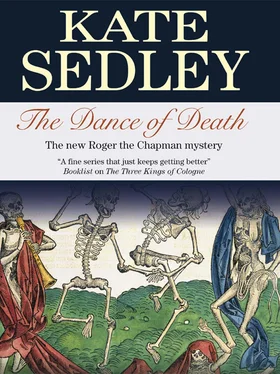Kate Sedley - The Dance of Death
Здесь есть возможность читать онлайн «Kate Sedley - The Dance of Death» весь текст электронной книги совершенно бесплатно (целиком полную версию без сокращений). В некоторых случаях можно слушать аудио, скачать через торрент в формате fb2 и присутствует краткое содержание. Жанр: Исторический детектив, на английском языке. Описание произведения, (предисловие) а так же отзывы посетителей доступны на портале библиотеки ЛибКат.
- Название:The Dance of Death
- Автор:
- Жанр:
- Год:неизвестен
- ISBN:нет данных
- Рейтинг книги:3 / 5. Голосов: 1
-
Избранное:Добавить в избранное
- Отзывы:
-
Ваша оценка:
- 60
- 1
- 2
- 3
- 4
- 5
The Dance of Death: краткое содержание, описание и аннотация
Предлагаем к чтению аннотацию, описание, краткое содержание или предисловие (зависит от того, что написал сам автор книги «The Dance of Death»). Если вы не нашли необходимую информацию о книге — напишите в комментариях, мы постараемся отыскать её.
The Dance of Death — читать онлайн бесплатно полную книгу (весь текст) целиком
Ниже представлен текст книги, разбитый по страницам. Система сохранения места последней прочитанной страницы, позволяет с удобством читать онлайн бесплатно книгу «The Dance of Death», без необходимости каждый раз заново искать на чём Вы остановились. Поставьте закладку, и сможете в любой момент перейти на страницу, на которой закончили чтение.
Интервал:
Закладка:
I stalked to the door, but unfortunately tripped over one of my own feet as I made what should have been a dignified exit. I heard Eloise’s gurgle of mirth and shut the door with unnecessary force behind me.
When she followed me up to our bedchamber some time later — how much later I wasn’t sure — I pretended to be sleeping.
Once again, I had a restless night, but I was growing used to it. My slumbers were broken by dreams without any rhyme or reason; farragos of nonsense that had no shape and melted away like dew in the sun almost as soon as I regained full consciousness. Awake, staring up at the bed-tester, moving aside the curtains a little to stare into the shadowy depths of one strange bedchamber after another, I was always acutely aware of Eloise beside me, of the soft murmurs she made while she slept, of the curve of her body and the scent of her hair. That particular night, she had once again curled into my side, one hand resting lightly on my right thigh, and it took every ounce of my moral strength not to rouse her and make love to her there and then. I was thoroughly roused myself, and was sweating with desire, lust, whatever you like to call it, cursing Duke Richard and Timothy Plummer for sending me on this mission to Paris with a woman who was not my wife. I don’t know how long I lay struggling with my emotions, listening to the sounds of the night from beyond the closed shutters — the hooting of an owl, the neigh of a horse, the barking of a dog — until my better self gained the upper hand and I fell at last into a sleep of exhaustion.
It was hardly surprising, therefore, that Eloise was up, washed, dressed and had descended to the inn parlour for breakfast before I was even out of bed. As it was, I cut myself shaving, scrambled into the first clothes that came to hand (blue hose, green jerkin, a dirty shirt and my old patched boots), failed to comb my hair or brush my teeth and, judging by Eloise’s glare of disapproval, arrived at table looking the wreck I felt. But it was with relief that I saw Raoul d’Harcourt was not yet present. Perhaps he, too, had suffered a disturbed night.
As I sipped my beaker of small beer and swallowed a basinful of gruel — at least, I think that’s what it was meant to be — I remarked smugly on his absence. ‘He heard me say sun-up,’ I said.
The innkeeper entering the parlour at that moment, Eloise turned and addressed him in rapid French. There was a good deal of Gallic shrugging of shoulders and spreading of hands — the usual waste of time — before mine host trundled off to look into the matter. He returned, after a wait of some minutes, to say that the gentleman had gone. He was not in his bedchamber or anywhere else in the inn. Even I could understand that much.
There was yet another rapid exchange between Eloise and the landlord — it sounded like an explosion of hailstones on a tiled roof — before she told me, looking nonplussed, ‘It seems that although Monsieur d’Harcourt is nowhere to be found, his baggage is still in his room.’
‘Gone for a walk?’ I suggested. The French were so excitable!
Eloise regarded me scornfully. ‘Hardly! With his boots and his cloak still in his room? It’s raining like the Great Flood out there, or are you still so drugged with sleep you haven’t noticed?’
As a matter of fact, I hadn’t, but now she mentioned it, I was suddenly aware of the sound of heavy rain spattering on the roof and the street cobbles.
‘Maybe he likes walking in the rain,’ I argued. ‘Maybe he has a spare pair of boots and another cloak. He looks rich enough to have two of everything. What about his horse?’ I added with a flash of inspiration. ‘Is it still in the stables?’
Investigation proved that it was.
‘There you are, then! He’s gone for a stroll. Some people enjoy walking in the wet. But I think it’s the end of his riding with us. John won’t wait on his fits and starts. He wants us on the road now, if not sooner. He’s determined we’ll be in Paris by Thursday.’
And so it proved. John Bradshaw was indifferent as to what had become of the Frenchman. Perhaps relieved, really, that it would be just the four of us without any need for play-acting.
‘It’s his own fault if he’s not ready to go with us,’ he said flatly. ‘I’ll tell Philip to bring round the horses.’ He noticed Eloise’s troubled expression and frowned. ‘Don’t worry about him, mistress,’ he said curtly. ‘I doubt he’s come to any harm. And now we’re nearly at our journey’s end, we’ve worries enough of our own.’
Sixteen
Thanks to one of the horses throwing a shoe (or whatever it is that horses do with shoes) and also to John Bradshaw being laid up for the best part of a day with stomach cramps — owing, he reckoned, to a bad piece of fish he had eaten — it was late on Friday afternoon before our somewhat bedraggled party of four entered Paris by the Porte Saint-Denis.
November had come in with its usual melancholy weather, and a thin rain had settled, mist-like, over our cloaks and assorted headgear, lowering our spirits even further. Conversation had been minimal for the past two days, decreasing until it was little more than absolute necessity dictated. John, naturally enough, was still suffering from the after-effects of his colic, but he had been sour before that. Something had irritated him and seriously ruffled his temper, but he did not confide in me and I could only guess at the cause. We were at last nearing our destination, and there were so many things that might go wrong. He seemed intent on shouldering the entire responsibility for the success or failure of the mission, in spite of my pointing out to him that he could hardly be blamed, at least in my particular case, for something he knew nothing about.
‘Timothy won’t see it like that,’ he grunted.
‘Don’t pretend you’re afraid of Timothy Plummer!’ I scoffed, but he merely shrugged and terminated the exchange by turning to upbraid Philip for some imagined misdemeanour.
I hadn’t failed to notice his growing exasperation with Philip, demonstrated almost hourly by an angry shout or even, at times, a blow, all of which Philip took with a kind of surly acceptance far more irritating than an angry response would have been. I think there were moments when John would have welcomed a bout of fisticuffs just to relieve the tension between them. I know that I often longed to take my old friend by the scruff of the neck and shake some life into him. My earlier sympathy, indeed my own grief for Jeanne, had been eroded by his behaviour.
As for Eloise, her continuing concern over the missing Raoul d’Harcourt was beginning to stretch my tolerance in another direction. For the first day after our leaving the inn, she had talked of nothing else, wondering, speculating as to his present whereabouts and whether or not some harm had befallen him. A particularly sharp exchange of views the following bedtime had resulted in my dragging pillows and one of the covers off the bed and spending the night on the floor. Since then, we had adhered rigidly to the most commonplace remarks and, on occasion, had even resorted to addressing one another through the medium of a third party. This childish behaviour had naturally enough added to John Bradshaw’s worries and contributed to his increasing bad temper.
By the time the walls of Paris came in view through the murky November twilight, we were all exhibiting the strains and tensions of an ill-assorted party thrown together for days on end and unable to escape one another.
Paris, like London, could be heard and smelled from several miles away, the noise and stench increasing the nearer one got. By the time we passed through the Porte Saint-Denis and proceeded down the Rue Saint-Denis, my senses were reeling, and it was all I could do to remain upright in the saddle.
Читать дальшеИнтервал:
Закладка:
Похожие книги на «The Dance of Death»
Представляем Вашему вниманию похожие книги на «The Dance of Death» списком для выбора. Мы отобрали схожую по названию и смыслу литературу в надежде предоставить читателям больше вариантов отыскать новые, интересные, ещё непрочитанные произведения.
Обсуждение, отзывы о книге «The Dance of Death» и просто собственные мнения читателей. Оставьте ваши комментарии, напишите, что Вы думаете о произведении, его смысле или главных героях. Укажите что конкретно понравилось, а что нет, и почему Вы так считаете.












